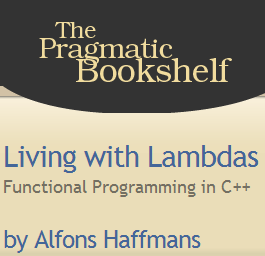
Living with Lambdas
by Alfons Haffmans
From the article:
You can work in the functional programming paradigm in C++. And you may be surprised at how complete C++’s support for functional programming is.
... C++ has always been a multi-paradigm language. And while previous attempts to add practical functional programming features required significant effort, recent additions to the C++ standard, like lambdas, have improved the situation. This paper explores the out-of-box support for functional programming provided by the new standard. We’ll look at techniques typically found in introductory functional programming textbooks. This article assumes familiarity with C++, but not necessarily with basic functional programming.
The source code is available in github and is compiled using gcc 4.8 installed on Mac OSX using MacPorts.

Add a Comment
Comments are closed.